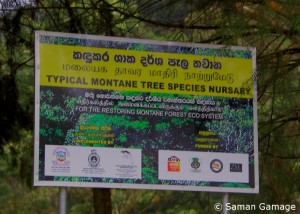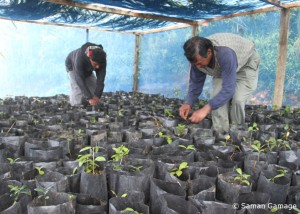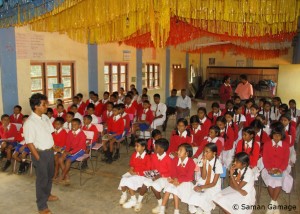 The Montane Evergreen Forests (MEF) of Sri Lanka will soon be expanding. This is great news for the Horton Plains slender loris (HPSL), a subspecies which is endemic to Sri Lanka and restricted to the MEF. These forests (1600m asl) are one of the critical ecosystems in Sri Lanka (not only for unique biodiversity but also valuable ecosystem services such as watershed protection) but due to human activities they have been exploited, fragmented and now persists as an isolated ecosystem.
The Montane Evergreen Forests (MEF) of Sri Lanka will soon be expanding. This is great news for the Horton Plains slender loris (HPSL), a subspecies which is endemic to Sri Lanka and restricted to the MEF. These forests (1600m asl) are one of the critical ecosystems in Sri Lanka (not only for unique biodiversity but also valuable ecosystem services such as watershed protection) but due to human activities they have been exploited, fragmented and now persists as an isolated ecosystem.
Recent studies have explored the MEF, demonstrating that the HPSL has a preference for the undisturbed primary forests over the secondary growth forests and are never found in Eucalyptus or Pine plantations (Gamage et al. in preparation). Unfortunately, a considerable amount of forested area in the montane region of Sri Lanka is covered with Eucalyptus or Pine plantations, which is seriously constraining the available habitat for this species. As part of the ongoing Red Slender Loris Conservation Project (RSLCP), a Species Conservation Strategy (SCS) has been drafted, which has identified the restoration of MEF and raising awareness among local stakeholders as priority activities for conservation of the HPSL.

Over the last couple of months our team members were able to complete five awareness programmes in the region with more than 350 participants, and able to start three plant nurseries for future replanting work.
We would also like to announce that the project and the Nuwara Eliya Urban Council (NEUC) is joining together for conservation of MEF and here after the NEUC has agreed to become a project partner. The project owes huge thanks to the Mayor of Nuwara Eliya for donating land (with a good water supply) to establish the plant nursery with native plants. Over last 10 months Nuwara Eliya has suffered an unusually long dry spell and the project was struggling to establish the plant nurseries, so we are hugely grateful to the NEUC. In addition to establishing our own nurseries, project personnel are providing technical and financial support to local people to establish their own private nurseries with native plants; 
The project would also like to offer sincere thanks to Professor S.W. Kotagama (Professor of Environment Science) and Mr. Aruna Padmaperuma (expert speaker for changing attitude) for spending their valuable time and giving speeches at all of the recent awareness programmes. This has helped us complete the following awareness events for a diverse audience:
- 55 school science teachers engaged from Nuwra Eliya. Venue – Holy Trinity National School -Tamil (collaborate with Zonal Education Director)
- Over 100 participants from plantation managers, superintendents, tea researchers and administrators. Venue – Tea Research Institute, Thalawakale (the event was jointly organized by Friends of Horton Plains organization and the RSLCP)
- Over 60 participants from government officers, hotel managers and members from local NGO’s. Venue – Urban Council Auditorium (the event was jointly organized by NEUC and RSLCP)
- Two school awareness programmes completed with over 150 students participating at Girls High School, Nuwara Eliya and Kudaoya School, Kothmale
Our plan is to expand these efforts across a number of other sites already identified and maintain the effort for at least the next five years. Hopefully longer!